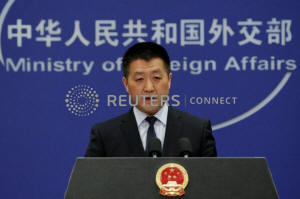|
China hits back at 'prejudiced' U.S. with
own rights criticism
 Send a link to a friend
Send a link to a friend
 [March 14, 2019]
By Michael Martina and Ben Blanchard [March 14, 2019]
By Michael Martina and Ben Blanchard
BEIJING (Reuters) - Citing poor media
freedoms, racism and "ideological prejudice", China hit back on Thursday
in unusually strong terms after the U.S. State Department slammed
China's rights record, including equating abuses on its Muslim
minorities with the 1930s.
U.S. Secretary of State Mike Pompeo highlighted abuses in Iran, South
Sudan, Nicaragua and China in the department's annual "Country Reports
on Human Rights Practices," but told reporters that China was "in a
league of its own when it comes to human rights violations".
Michael Kozak, the head of the State Department's human rights and
democracy bureau, said mistreatment of China's Muslim minorities in the
Xinjiang region was like hadn't been seen "since the 1930s", apparently
referring to the policies of persecution of Hitler's Germany and
Stalin's Soviet Union.
Speaking in Beijing, Chinese Foreign Ministry spokesman Lu Kang said the
U.S. report was as usual filled with "ideological prejudice" and
groundless accusations, and that China had lodged a complaint with
Washington about it.

China fully safeguards human rights and China has made many achievements
in this regard, he added.
"We also advise that the United States take a hard look at its own
domestic human rights record, and first take care of its own affairs."
China has roundly rejected concern about its policies in Xinjiang, where
rights groups say the government is operating internment camps holding a
million or more Muslims. China says they are vocational training centers
aimed at de-radicalisation.
Adding to Beijing's strong push-back, the Chinese government on Thursday
issued its annual rebuttal to criticism from Washington about China's
human rights record.
China's State Council, or Cabinet, said the United States was a
self-styled "human rights defender," that has a human rights record
which is "flawed and lackluster".
"The double standards of human rights it pursues are obvious," it said.
The report pointed to the high rate of gun deaths, racial
discrimination, and also lack of media freedom, despite China being
ranked 176 last year on the world press freedom index of Reporters
Without Borders, ahead of only Syria, Turkmenistan, Eritrea and North
Korea.
[to top of second column]
|

Chinese Foreign Ministry spokesman Lu Kang answers questions about a
major bus accident in North Korea, during a news conference in
Beijing, China April 23, 2018. REUTERS/Jason Lee

"Press freedom has come under unprecedented attack," it said,
pointing to cases of reporters in the United States being arrested
and prevented from doing their jobs.
"The U.S. government continues to publicly and fiercely accuse the
media and journalists of creating 'fake news' and creating an
atmosphere of intimidation and hostility," the report said.
"Reporters' legal right to report has been violated," it added,
pointing to cases of the White House stripping some reporters of
press credentials.
There is no routine access to China's presidential office and no
presidential spokesman. President Xi Jinping only very rarely takes
questions from any reporters, let alone foreign media.
China's report cited reports by foreign news organizations,
including Reuters, the BBC, Newsweek and the Washington Post, for
evidence of rights abuses in the United States.
Human rights have long been a source of tension between the world's
two largest economies, especially since 1989, when the United States
imposed sanctions on China after a bloody crackdown on pro-democracy
demonstrators in and around Beijing's Tiananmen Square.
China routinely rejects criticism of its rights record and has
pointed to its success at lifting millions out of poverty, and that
nobody has the right to criticize its model of government.

But the ruling Communist Party brooks no political dissent and
President Xi Jinping's administration has overseen a sweeping
crackdown on rights lawyers and activists.
(Reporting by Michael Martina; Writing by Ben Blanchard; Editing by
Robert Birsel and Clarence Fernandez)
[© 2019 Thomson Reuters. All rights
reserved.]
Copyright 2019 Reuters. All rights reserved. This material may not be published,
broadcast, rewritten or redistributed.
Thompson Reuters is solely responsible for this content. |